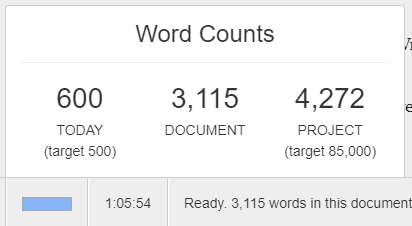One of the most interesting problems we've been working on solving with ApolloPad is word counting. When I say interesting, I am aware that may not be everyone's cup of tea. If you are curious about why word counting might be more complicated than you thought, please read on.

When you think "word count", you probably think of the total number of words in whatever you are working on. The total words in any given project is a measure of its size. It's simple and easy to calculate. With ApolloPad, your total word count for any project or chapter is exactly what you think it should be. That bit ... not so interesting.
Where we hit a tricky problem is the daily word count and your daily word target.
Deletion
In ApolloPad you can set a specific number of words you want to write every day (mine is 500). Every writer is different, but to me, the aim is to ensure I spend roughly the same amount of time writing every day, at a minimum. The target is, for me, about consistency of effort.
So if I write "the cat climbed over the fence", I would expect my word count for the day to increase by six.
But what happens if I then delete that sentence? I did write those words. At the time, I was productive. Those six words are part of what I achieved. If I go on to delete them, my total word count will have dropped, but I was no less productive at the time.
How about if I add six new words, but delete ten completely different words? Is my net result for the day a loss of 4? What if I write a new chapter of 2,000 scintillating words, and then delete a rubbish chapter of 3,000? There's no doubt I was productive that day, and my work has been improved by what I did.
The problem we found was that if deleting text decreases your daily word count, then the software inadvertently creates a negative consequence to editing your document. It gives you a reason not to delete content, even if deleting that content might be the best thing for your work.
That struck us as roundly unfair. Part of the process of writing is being able to cut freely, and many people struggle with doing that already. Who are we to make it harder?
Editing
The problem doesn't stop with deletion. What if I change the text to read "the mouse climbed over the cat"? Is that six new words, because it's a new sentence? Is it one, because "mouse" has been added? Is it two, because "cat" is in a new position? What if we change "fence" to "fences", should that count as a new word added?
What if that same sentence is deleted from one place, and then re-added somewhere else in your document. Should the words count again?
Our Approach
All of the above are questions we have probably spent more time on than is sensible. In the end, we decided to create some guidelines for this problem:
- The aim of the daily target is to help people get into the habit of writing every day.
- The daily target is a measure of productive time, not final output.
- We will try not to create artificial incentives or disincentives to editing:
- We won't discourage or punish deletions.
- We won't reward transpositions.
- In any instance where there is any doubt about whether something should count towards the daily word count, we will always choose to add to the daily word count.
We are looking at adding some more statistics to ApolloPad, and we will likely include a second daily word count to show the net gain (or loss) of word count over a day, but in the meantime we hope this explains a little of how the daily word count works and what it is trying to do.

